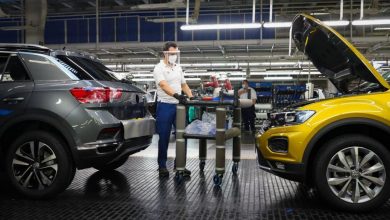
Renault, Nissan say alliance is not headed for breakup
“The alliance is the source of Nissan’s competitiveness,” Nissan said in a statement Tuesday, pushing back against reports that its executives have looked at the possibility of breaking with the global carmaking partnership.
“Through the alliance, to achieve sustainable and profitable growth, Nissan will look to continue delivering win-win results for all member companies,” the statement said.
Renault shares hit six-year lows on Monday as investors worried the French automaker’s 20-year cost-sharing alliance with Nissan was headed for a break-up without Carlos Ghosn to hold it together.
Long-standing tensions in the Franco-Japanese partnership have been heightened since Ghosn’s arrest in Tokyo in November 2018 on allegations of financial misconduct, which he denies.
In a news conference last week, the first since Ghosn’s dramatic escape to Lebanon, the former chairman of Nissan and Renault trashed the recent performance of the carmakers.
The two companies have struggled financially — their shares were the worst performers among major automakers last year — and have been drifting apart at a time when the costs of electrification and autonomous driving are pressuring incumbent carmakers to team up or consolidate.
It’s unclear how feasible any separation would be given that Renault holds 43 percent of Nissan’s shares as its biggest shareholder, while Nissan owns 15 percent of its French partner.
Alliance pros and cons
Even so, Nissan has been exploring the pros and cons of sustaining the alliance, particularly when it comes to engineering and technology sharing, said a person familiar with the matter told, who asked not to be identified discussing confidential matters. Those studies predate Ghosn’s escape from Japan and were preliminary, so no decision has been made, the person told Bloomberg.
The companies are trying to forge solutions to problems with their long-standing partnership, and launch new joint industrial projects, people familiar with the situation said. So far, those efforts have not produced visible results.
Alliance relations were further strained last year by Renault’s failed attempt to merge with Fiat Chrysler. But the roots of the tensions go back years.
A major sticking point since 2015 has been the equal division of costs for r&d into new technology and products, two sources close to Nissan told Reuters.
That strategy “did not compensate Nissan’s work properly: Nissan’s engineering output was 40 percent better, meaning Nissan engineers on average produced 40 percent more than their Renault counterparts in a given amount of time spent on a job,” said one of the sources. “When measured more strictly, Nissan’s output in some cases was double Renault’s,” he said.
Nissan has asked for an analysis of the workloads and productivity of Renault and Nissan staffs, one person familiar with the situation said.
Divisions within Nissan’s senior management are complicating efforts to fix the alliance and launch new projects, sources said.
Renault is in the process of choosing a new CEO after ousting Thierry Bollore in October and late last year Nissan picked Makoto Uchida, known for having close ties with Renault, as CEO.
Some developments set in motion during the Ghosn era are due to come to fruition in 2020 – Nissan’s crossover electric car, based on its Ariya concept model, will be the first to launch on a new joint electric platform, and in 2021 a Renault equivalent should also take shape.
Senard, who joined Renault from tire maker Michelin as chairman in early 2019 after Ghosn’s arrest, has vowed to get the alliance working by this year, although the firms have yet to present new common initiatives.
“The problem is today, there’s nothing concrete as we look ahead, no goals,” a former senior employee at Renault said.
Font: Automotive News Europe





